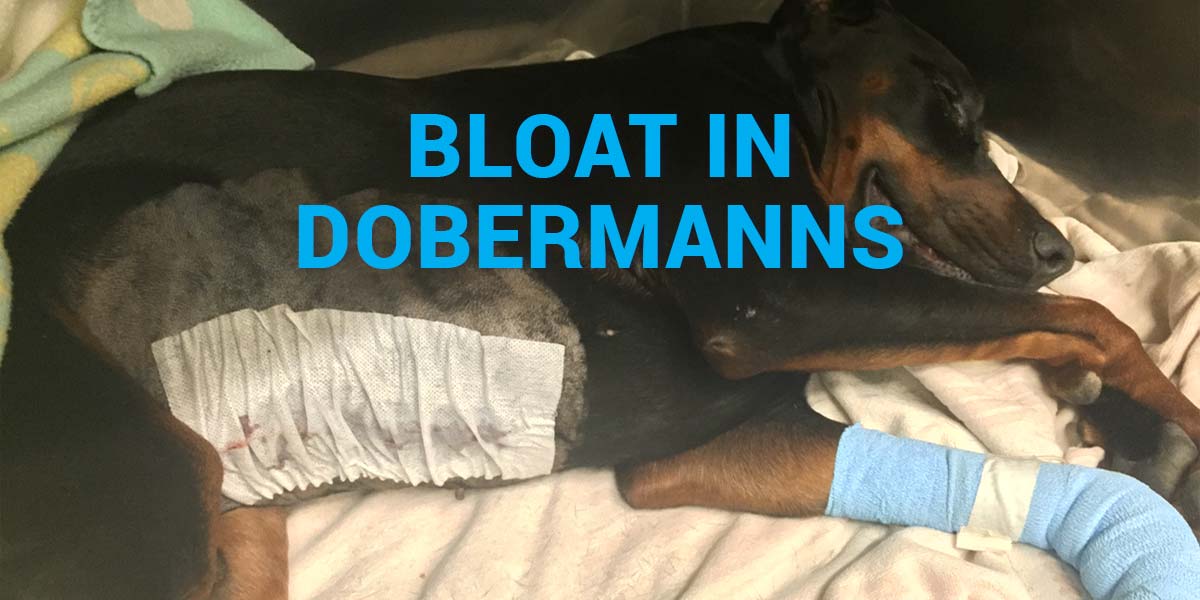When it comes to the health of doberman puppies, there is one condition that can be quite dangerous – bloat. Although it may come as a surprise, even these strong and athletic dogs can be susceptible to bloat.
Bloat, also known as gastric dilatation-volvulus, is a life-threatening condition that can occur when a dog’s stomach fills with gas, causing it to twist. This can lead to a range of symptoms, including discomfort, restlessness, bloating of the abdomen, and difficulty breathing. It is important for doberman puppy owners to be aware of the potential risks and take preventative measures.
Doberman puppies are susceptible to bloat, a life-threatening condition where the stomach fills with gas and twists. To minimize the risk, feed them multiple small meals throughout the day instead of one large meal. Avoid vigorous exercise before and after meals. Monitor their food intake and prevent them from eating too fast. Provide a calm and stress-free environment. If you notice any symptoms of bloat, such as a distended abdomen or restlessness, seek immediate veterinary care.

Can Doberman Puppies Get Bloat?
Doberman puppies are known for their elegance, intelligence, and loyalty. However, like any other breed, they are susceptible to certain health issues. One common concern among Doberman owners is the risk of bloat or gastric dilatation-volvulus (GDV). But can Doberman puppies actually get bloat? Let’s explore this topic further.
What is Bloat?
Bloat, also known as gastric dilatation-volvulus (GDV), is a life-threatening condition that can affect dogs, including Doberman puppies. It occurs when the stomach fills up with gas or fluid, causing it to expand. In some cases, the stomach can twist, leading to a dangerous situation.
When a puppy experiences bloat, their abdomen may appear swollen or distended. They may also exhibit signs of discomfort, restlessness, and may attempt to vomit without success. Bloat is a severe emergency that requires immediate medical attention to prevent complications and save the puppy’s life.
Causes of Bloat in Doberman Puppies
While the exact cause of bloat in Doberman puppies is not fully understood, several factors may contribute to its development. These factors include:
- A genetic predisposition: Doberman Pinschers are considered a breed at higher risk of developing bloat.
- Rapid eating: Doberman puppies who eat too quickly or swallow large amounts of air while eating are more prone to bloat.
- Excessive exercise before or after meals: Strenuous activities before or after eating can increase the risk of bloat in Doberman puppies.
- Stress: High-stress situations or anxiety can potentially trigger bloat in susceptible puppies.
- Feeding from elevated bowls: Some studies suggest that feeding puppies from elevated bowls may increase the risk of bloat, although more research is needed to establish a definitive link.
Preventing Bloat in Doberman Puppies
Although bloat cannot be completely eliminated, there are steps you can take to reduce the risk of bloat in Doberman puppies:
- Feed your Doberman puppy multiple small meals throughout the day instead of one large meal.
- Avoid feeding your puppy immediately before or after exercise.
- Use slow feeder bowls or puzzle toys to slow down their eating and prevent rapid ingestion of food.
- Provide a calm and low-stress environment for your puppy.
Symptoms and Treatment
If you suspect that your Doberman puppy may be experiencing bloat, it is crucial to seek veterinary care immediately. Some common symptoms of bloat in puppies include:
- Unsuccessful attempts to vomit
- Abdominal distention or swelling
- Restlessness and pacing
- Difficulty breathing
- Whining or vocalizing in discomfort
Upon arrival at the veterinary clinic, the veterinarian will perform a physical examination and may order diagnostic tests such as X-rays or an ultrasound. Treatment for bloat typically involves stabilizing the dog’s condition and performing emergency surgery to correct the twisted stomach if necessary.
Can Doberman Puppies Lead Normal Lives After Bloat?
While bloat is a serious condition, with prompt veterinary care and proper treatment, many Doberman puppies can recover and lead normal lives afterward. However, it’s crucial to follow the veterinarian’s instructions for post-operative care and make any necessary lifestyle adjustments to reduce the risk of future episodes.
Key Takeaways: Can Doberman Puppies Get Bloat?
- Doberman puppies are at risk of developing bloat, a serious and potentially life-threatening condition.
- Bloat occurs when the stomach fills with gas or fluid and becomes twisted, cutting off blood supply to important organs.
- Symptoms of bloat in Doberman puppies may include restlessness, a distended abdomen, unproductive retching, and difficulty breathing.
- If you suspect your Doberman puppy has bloat, seek immediate veterinary attention as it requires prompt medical intervention.
- Preventive measures such as feeding multiple smaller meals, avoiding exercise immediately after meals, and discussing surgery options with your vet can help reduce the risk of bloat in Doberman puppies.
Frequently Asked Questions
Here are some common questions about the risk of bloat in Doberman puppies:
1. At what age can Doberman puppies be at risk of developing bloat?
Doberman puppies can be at risk of developing bloat as early as 6 months of age. While bloat is more common in adult dogs, it’s not unheard of for puppies to experience this potentially life-threatening condition. It’s important to be aware of the signs and take preventive measures to reduce the risk.
Bloat, also known as gastric dilatation-volvulus (GDV), occurs when the stomach fills with gas and becomes twisted. This can happen due to various factors, including genetics, diet, exercise, and stress. While the exact cause of bloat is not fully understood, certain breeds, including Dobermans, are considered to be more predisposed to developing this condition.
2. How can I minimize the risk of bloat in my Doberman puppy?
While there is no guaranteed way to prevent bloat, there are some measures you can take to minimize the risk for your Doberman puppy:
a. Feed small, frequent meals: Instead of one large meal, divide your puppy’s daily food into several smaller meals throughout the day.
b. Avoid exercise before and after meals: Wait at least one hour before or after meals before engaging in vigorous exercise or play to reduce the chances of bloat.
c. Use elevated feeders: Elevated food and water bowls can help promote proper digestion and reduce the risk of swallowing excessive air while eating.
d. Discourage rapid eating: Use puzzle feeders or slow-feed bowls to encourage your Doberman puppy to eat at a slower pace, preventing gulping of food and air intake.
3. What are the symptoms of bloat in Doberman puppies?
The symptoms of bloat in Doberman puppies may include:
a. Unproductive attempts to vomit: Your puppy may try to vomit but nothing comes out.
b. Distended abdomen: The stomach may appear swollen and enlarged.
c. Restlessness and discomfort: Your puppy may be restless, pace, drool excessively, or have difficulty getting comfortable.
d. Rapid breathing and increased heart rate: Shallow and rapid breathing, along with an elevated heart rate, can be signs of bloat.
e. Weakness and collapse: In severe cases, puppies may show weakness, collapse, or go into shock.
4. What should I do if I suspect my Doberman puppy has bloat?
If you suspect your Doberman puppy has bloat, it’s essential to seek immediate veterinary attention as bloat is a medical emergency. Do not try to treat it at home. The veterinarian will perform a physical examination, possibly take X-rays, and may need to perform emergency surgery to correct the twisted stomach and relieve the pressure.
Time is of the essence, so don’t delay in contacting your veterinarian or the nearest emergency veterinary clinic if you suspect bloat in your Doberman puppy.
5. Can bloat be fatal for Doberman puppies?
Yes, bloat can be fatal for Doberman puppies if not treated promptly. The twisted stomach can cut off blood circulation, leading to tissue damage and organ failure. Without surgical intervention, bloat can be a life-threatening condition. It’s crucial to recognize the signs, seek immediate veterinary care, and take preventive measures to reduce the risk of bloat in Doberman puppies.

In summary, yes, Doberman puppies can get bloat, a potentially life-threatening condition that affects their stomach. Bloat occurs when the stomach fills with gas and becomes distended, putting pressure on other organs.
To prevent bloat in Doberman puppies, it’s important to feed them smaller, more frequent meals and avoid vigorous exercise before and after meals. It’s also crucial to avoid situations that can cause stress and anxiety, as these can contribute to the development of bloat. If you notice any symptoms of bloat in your Doberman puppy, such as restlessness, unsuccessful attempts to vomit, a swollen abdomen, or a rapid heart rate, it’s important to seek immediate veterinary care.
